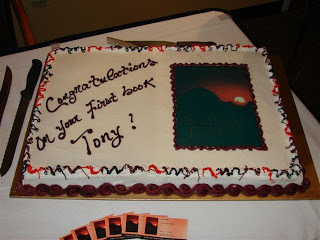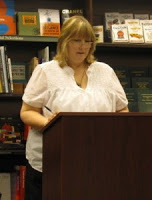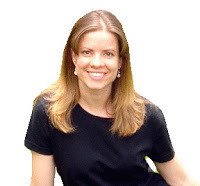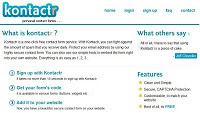Tony Eldridge's Blog, page 20
April 21, 2011
How to Build Success into Your Non-Fiction Book by Jennifer Tribe
Today, I'm happy to introduce you to our guest author, Jennifer Tribe. Jennifer is a principal at Highspot where she works with branding and marketing intellectual capital. In today's post, Jennifer gives tips on how to create a non-fiction book that has the best chances for success.
Before we get to her post, I have one quick in-house announcement. We are just hours away from launching our next Twitter contest. I've lined up an all-star cast of sponsors who have generously provided prizes that will help you with your book marketing activities. With nearly 20 sponsors and all kind of prizes, you'll not want to miss this contest if you are an author. It's free to enter and all the details will be on this blog tomorrow.
Now, on to Jennifer's post...
How to Build Success into Your Non-Fiction Book
by Jennifer Tribe
On the self-publishing journey, there's the production of your book and there's the marketing of your book. Two separate things, right?
Nope!
How you create your book will have an impact on your marketing efforts. If you miss an important registration detail, fail to follow an industry norm or make it difficult for readers to find you, your marketing becomes that much more difficult.
While producing a great book doesn't automatically guarantee sales success, a book with sloppy production values is hobbled right out of the gate. Here are some tips for building success into your book from the beginning.
Spend time on the title
Coming up with a great title isn't easy, but it's worth working on. Too many first-time authors try cramming a 25-word synopsis of their book into the title. They end up with titles that are insufferably long, hard to understand and impossible to remember. Yawn. Titles are usually very short, sometimes just one or two catchy words. The subtitle then picks up the job of describing the book in a bit more detail -- but still use only five to eight words or so.
Hire a professional designer
People really do judge a book by its cover, even when it's just a thumbnail. Whether people are browsing a shelf at their local bookstore or clicking through Amazon.com, whether they spy a copy of your book on a friend's coffee table or reach your website from a tweet, the first they'll see of your book is the cover. So much rests on the image your cover conveys that it's foolish to risk a poor impression. Hire an experienced professional to design it. Can't afford it? You can't afford not to.
Register your book
Every book needs an ISBN. (Without one, you can't even sell through Amazon.) Also register your book with your national library, whether that's the Library of Congress or the National Library of Canada, and invest in having Cataloguing-in-Publication data created. These registrations ensure your book looks professional and is discoverable.
Remember the formula: If p, then e
Despite what you may read, print books aren't in danger of disappearing anytime soon. Plus, print books still work best as gifts or client premiums; having something tangible to hand out is crucial to making the right impression. So it makes sense, most of the time, to plan on a print edition. Just don't overlook e-books altogether. It's so easy and inexpensive to spin off an electronic edition from print files that it should be an automatic part of every author's publishing process. The more ways people can access your book, the greater the chance of a sale.
Edit your book well
Editing is last on the list, not because it's least important, but because it supports everything else. You can have an outstanding title, a kick-ass cover and multiple available formats, but if people read your book and find the content stinks, you won't go far.
Fill your non-fiction book with helpful information, not promotional copy. People don't want to pay money to read a long brochure.
Keep it tight. If you can tell readers how to solve a problem in 200 pages instead of 300 pages, do it. If you can explain the topic in 100 pages, consider a shorter format, like a Kindle Single. Avoid padding just to hit a page count.
Watch your stale date. A book is no small project so it's best to create a product you can sell for years to come. As much as you can, avoid information that changes frequently. Instead, focus on timeless principles and point people to your website for information that needs regular updating.
Hire a professional editor. In fact, hire a couple. At Highspot, we employ up to four different editors on each book because we know that fresh eyes at every stage of the process -- from developmental editing through copyediting and printer's proofs -- help us catch more mistakes.
When self-publishing, it pays to think about your book like a traditional publisher: how can you get the best return on your investment? In a hypercompetitive market, give your book a fighting chance with top-notch production values, then market it as the great product you know it be.
 Jennifer Tribe is a principal at Highspot where she helps business owners package, brand and sell their intellectual capital. Helping clients self-publish non-fiction books is a specialty. Find free publishing resources, like the Author's Guide to Publishing Options, on the Highspot website.
Jennifer Tribe is a principal at Highspot where she helps business owners package, brand and sell their intellectual capital. Helping clients self-publish non-fiction books is a specialty. Find free publishing resources, like the Author's Guide to Publishing Options, on the Highspot website.
Related Posts
Authors, Be careful Not To Overpay For POD Services
Searching For Book Ideas And Inspiration On Amazon.com By Roger C. Parker
The Importance of Editing By Gloria Oren
When Should You Stop Marketing Your Book?
-------- Tony Eldridge is the author of The Samson Effect , an action/adventure novel that Clive Cussler calls a "first rate thriller brimming with intrigue and adventure." He is also the author of the Twitter marketing book, Conducting Effective Twitter Contests .








Before we get to her post, I have one quick in-house announcement. We are just hours away from launching our next Twitter contest. I've lined up an all-star cast of sponsors who have generously provided prizes that will help you with your book marketing activities. With nearly 20 sponsors and all kind of prizes, you'll not want to miss this contest if you are an author. It's free to enter and all the details will be on this blog tomorrow.
Now, on to Jennifer's post...
How to Build Success into Your Non-Fiction Book
by Jennifer Tribe
On the self-publishing journey, there's the production of your book and there's the marketing of your book. Two separate things, right?
Nope!
How you create your book will have an impact on your marketing efforts. If you miss an important registration detail, fail to follow an industry norm or make it difficult for readers to find you, your marketing becomes that much more difficult.
While producing a great book doesn't automatically guarantee sales success, a book with sloppy production values is hobbled right out of the gate. Here are some tips for building success into your book from the beginning.
Spend time on the title
Coming up with a great title isn't easy, but it's worth working on. Too many first-time authors try cramming a 25-word synopsis of their book into the title. They end up with titles that are insufferably long, hard to understand and impossible to remember. Yawn. Titles are usually very short, sometimes just one or two catchy words. The subtitle then picks up the job of describing the book in a bit more detail -- but still use only five to eight words or so.
Hire a professional designer
People really do judge a book by its cover, even when it's just a thumbnail. Whether people are browsing a shelf at their local bookstore or clicking through Amazon.com, whether they spy a copy of your book on a friend's coffee table or reach your website from a tweet, the first they'll see of your book is the cover. So much rests on the image your cover conveys that it's foolish to risk a poor impression. Hire an experienced professional to design it. Can't afford it? You can't afford not to.
Register your book
Every book needs an ISBN. (Without one, you can't even sell through Amazon.) Also register your book with your national library, whether that's the Library of Congress or the National Library of Canada, and invest in having Cataloguing-in-Publication data created. These registrations ensure your book looks professional and is discoverable.
Remember the formula: If p, then e
Despite what you may read, print books aren't in danger of disappearing anytime soon. Plus, print books still work best as gifts or client premiums; having something tangible to hand out is crucial to making the right impression. So it makes sense, most of the time, to plan on a print edition. Just don't overlook e-books altogether. It's so easy and inexpensive to spin off an electronic edition from print files that it should be an automatic part of every author's publishing process. The more ways people can access your book, the greater the chance of a sale.
Edit your book well
Editing is last on the list, not because it's least important, but because it supports everything else. You can have an outstanding title, a kick-ass cover and multiple available formats, but if people read your book and find the content stinks, you won't go far.
Fill your non-fiction book with helpful information, not promotional copy. People don't want to pay money to read a long brochure.
Keep it tight. If you can tell readers how to solve a problem in 200 pages instead of 300 pages, do it. If you can explain the topic in 100 pages, consider a shorter format, like a Kindle Single. Avoid padding just to hit a page count.
Watch your stale date. A book is no small project so it's best to create a product you can sell for years to come. As much as you can, avoid information that changes frequently. Instead, focus on timeless principles and point people to your website for information that needs regular updating.
Hire a professional editor. In fact, hire a couple. At Highspot, we employ up to four different editors on each book because we know that fresh eyes at every stage of the process -- from developmental editing through copyediting and printer's proofs -- help us catch more mistakes.
When self-publishing, it pays to think about your book like a traditional publisher: how can you get the best return on your investment? In a hypercompetitive market, give your book a fighting chance with top-notch production values, then market it as the great product you know it be.
 Jennifer Tribe is a principal at Highspot where she helps business owners package, brand and sell their intellectual capital. Helping clients self-publish non-fiction books is a specialty. Find free publishing resources, like the Author's Guide to Publishing Options, on the Highspot website.
Jennifer Tribe is a principal at Highspot where she helps business owners package, brand and sell their intellectual capital. Helping clients self-publish non-fiction books is a specialty. Find free publishing resources, like the Author's Guide to Publishing Options, on the Highspot website.Related Posts
Authors, Be careful Not To Overpay For POD Services
Searching For Book Ideas And Inspiration On Amazon.com By Roger C. Parker
The Importance of Editing By Gloria Oren
When Should You Stop Marketing Your Book?
-------- Tony Eldridge is the author of The Samson Effect , an action/adventure novel that Clive Cussler calls a "first rate thriller brimming with intrigue and adventure." He is also the author of the Twitter marketing book, Conducting Effective Twitter Contests .








Published on April 21, 2011 04:00
April 20, 2011
Celebrate Your Author Anniversaries With Your Readers
 Whether it's birthdays or anniversaries, there's something about the human nature that loves to look back and celebrate beginnings. Perhaps it's the sense of accomplishment that the passage of time accentuates. Perhaps it's the reminders of sacrifices that we made when we embarked on a journey. Perhaps it's just that we like cake and ice cream. Whatever the reason, we will always find a cheering and supportive base who genuinely join in the celebration with us.
Whether it's birthdays or anniversaries, there's something about the human nature that loves to look back and celebrate beginnings. Perhaps it's the sense of accomplishment that the passage of time accentuates. Perhaps it's the reminders of sacrifices that we made when we embarked on a journey. Perhaps it's just that we like cake and ice cream. Whatever the reason, we will always find a cheering and supportive base who genuinely join in the celebration with us. Today is a special day for me. First and foremost, my twin boys are 5 years old today. I can't begin to express the emotion wrapped up in this birthday. But today marks another accomplishment. This is the 400th post for Marketing Tips For Authors. When I look back at the feeble beginnings of this blog, I am humbled by how far it has come, thanks to readers like you.
So today, I am very aware of the importance of anniversaries. As authors, I know that you have your own anniversaries. But have you thought about sharing your milestones and accomplishments with your readers? From a marketing standpoint, businesses large and small know the power of anniversaries. Consider these milestones you can share with your readers:
Anniversary Publication Date
Major Blog Post Milestone
Anniversary For Your Business
Your Birthday
First Interview Anniversary
First Review Anniversary
E-Book Anniversary
Social Site Anniversary
As you can see, the list can go on and on. The best way to approach this, in my humble opinion, is to think about those milestones that are special to you. What are the ones that touch that emotional string of your soul; the one you think about that gives you a warm sense of accomplishment? That's the one I'd share with your readers. They'll be able to see how much it means to you and join in your celebration.
So, what are your special days, your special milestones? Share them with your readers. Invite them to celebrate your accomplishments with you. These days are fleeting, so reach out and stop time for a day and make memories that will stay with you for a lifetime. Celebrating you author anniversaries with your readers is a wonderful way to do this.
(A special thanks to my wonderful wife, Emily, who threw my first book party and bought a totally awesome cake! Years later, I still remember it as a high point of my life.)
Related Posts
Teaming Up With Another Writer For Offline Promotion
Review: Frugal and Focused Tweeting for Retailers by Carolyn Howard-Johnson
Do-It-Yourself Marketing by Jerry B. Jenkins
How OK! Magazine Taught Me A Thing Or Two About Book Promotion By Dorothy Thompson
Using Cross Promotions To Save Money And Sell Books By Jessica James
-------- Tony Eldridge is the author of The Samson Effect , an action/adventure novel that Clive Cussler calls a "first rate thriller brimming with intrigue and adventure." He is also the author of the Twitter marketing book, Conducting Effective Twitter Contests .








Published on April 20, 2011 04:00
April 19, 2011
Examining Online Media: How To Build An Audience Before Your Book Is Published! By Pat Hauldren
 Today, I'm happy to reintroduce you to a returning guest on this blog. Pat Hauldren is a prolific writer and lecturer. Today, she's sharing tips on how you can build an audience even before your book is published.
Today, I'm happy to reintroduce you to a returning guest on this blog. Pat Hauldren is a prolific writer and lecturer. Today, she's sharing tips on how you can build an audience even before your book is published. Examining Online Media: How To Build An Audience Before Your Book Is Published!
By Pat Hauldren
Writers marketing their work can occur in many different ways. In this blog post, we'll discuss how I chose to market myself before my book is even published!
Who am I?
I'm Pat Hauldren. I write five columns for an online news media called Examiner.com. I also write for other venues, like Demand Studios, various freelance writing sites, and two local online news media: North Texas eNews and Beacon-News.com. I also write and publish short stories, poetry, Japanese Noh Drama, and am working on my third novel with requests from five agents. Remember this, because at the end of this post, I'll ask you a question.
What got me started in writing articles along with my fiction?
A few years ago, I realized that just writing a novel was extremely frustrating. (Anyone noticed? LOL) I'm unable to work due to a disability and as a result, really missed the affirmation a regular paycheck offered (not to mention the hit to my poor ego. Believe me, SSD is not much of an ego boost.) I realized that I needed a bit more than hiding at my desk for 6 months or more writing a novel. Even writing short stories, while greatly satisfying to see my story in print and get a bit of $$ in the process, didn't really help my ego, nor my bank account, on a regular basis.
Yes, I admit it. I craved recognition and affirmation that I was a "writer", a "real writer", not just a wannabe hack who likes to talk to herself and daydream. It's a terrible fault, I thought at the time, but came to realize, I wasn't the only one. All writers have this "fault" to some degree. It's what makes us human.
What do to do about it?
I delved into online media opportunities. I tried everything, from freelance writing to pumping out articles like a machine, from reviewing books to blogging. All were very informative, but I wasn't getting much writing done on my novel! So, I had to learn to select the media I wanted, and focus.
I had to sit down and think about what I really wanted out of online media and how best to use those needs without sacrificing my true love, fiction. I had to ask:
What do I want out of writing for online media?
Most of us will agree that we want to grow an audience. But that's more than just wishing, it's a necessity for us authors. Without readers buying our books and other works, we are still writers, but we aren't selling writers.
And so, I write online media, get a few $, lots of name recognition, with millions of readers world-wide, and now, I am conducting classes on how to build an audience while you write your book. And it doesn't matter if it's the first book or the fifth book, it's never too late to start growing your audience.
Question of the day: If an agent or editor has two equally well-written manuscripts in hand and has to choose just one to publish, which one will she choose?
A. Manuscript A: the manuscript sent in on blind submission... OR
B. Manuscript C: the manuscript sent in on blind submission, and writes for online media, states so in her query letter, revealing that she has a "canned" audience lined up to read her book?
Your goal:
I think you can see that our goal here is to get your name out there and build an audience to increase your book sales when you're ready.
Experiment with different online media: Examiner.com, Demand Studios, Suite 101, About.com, Salon, etc. and find one that fits your needs and schedule. Remember, as an author, your goal is to build an audience, not get rich as a journalist, nor limit yourself or stifle your creativity.
If you're interested in learning more about this topic, keep an eye on my website, www.PatHauldren.com/workshops, for upcoming workshops on this subject and many more.
Related Posts
How Networking Worked for Me By Pat Hauldren
Pre-Publication Book Marketing Tips By Rachel Thompson
Pre-Publication Book Marketing Activities By Rick Chesler
Pre-Natal Care for Your Book by Lynn Serafinn
-------- Tony Eldridge is the author of The Samson Effect , an action/adventure novel that Clive Cussler calls a "first rate thriller brimming with intrigue and adventure." He is also the author of the Twitter marketing book, Conducting Effective Twitter Contests .








Published on April 19, 2011 04:00
April 18, 2011
Building Your Reputation As A Guest Blogging Powerhouse With Shelley Hitz
 Today, I'm honored to be part of Shelley Hitz's blog tour for her Step By Step Guide To Guest Blogging. This tour is a podcast tour with stops on many blogs where you can listen to Shelley teach valuable lessons on successful guest blogging.
Today, I'm honored to be part of Shelley Hitz's blog tour for her Step By Step Guide To Guest Blogging. This tour is a podcast tour with stops on many blogs where you can listen to Shelley teach valuable lessons on successful guest blogging.On my blog's stop, Shelley will be teaching you how to build your reputation as a guest blogging powerhouse. This short audio clip, that you can download or listen to online, packs a powerful punch that will enhance your guest blogging experience and success.
After you listen to Shelley's message, make sure you leave a comment because she's giving away a free copy of her Step By Step Guide To Guest Blogging to one lucky commenter on the tour. As always, if you're reading this post on a syndicated source, you might have to visit my blog to have access to the embedded audio play in order to hear today's podcast.

To see all the stops on Shelley's tour and listen to other great tips on successful guest blogging, visit her podcast tour page.
Download and read Shelley's free PDF report called, "Guest Blogging Success for Authors."
 Shelley Hitz is an entrepreneur, author and speaker. Her website, Self Publishing Coach, provides resources and tutorials that help you publish and market your book. Sign up for her newsletter, Self Publishing Tips to download her book templates, which she offers surprisingly free.
Shelley Hitz is an entrepreneur, author and speaker. Her website, Self Publishing Coach, provides resources and tutorials that help you publish and market your book. Sign up for her newsletter, Self Publishing Tips to download her book templates, which she offers surprisingly free. You can also find Shelley on Facebook, Twitter and YouTube.
Here's one final message from our guest, Shelley Hitz...
Related Posts
Create and Sell an Audio Book Using These 5 Simple Steps By Shelley Hitz
5 Tips To Get Massive Exposure For Your Book With Blog Tours
Enhance Your Blog and Ezine with Guest Posts by Dana Lynn Smith
Guest Blogging Topics to Avoid By Angela Wilson
Touring in a Virtual World By L Diane Wolfe
-------- Tony Eldridge is the author of The Samson Effect , an action/adventure novel that Clive Cussler calls a "first rate thriller brimming with intrigue and adventure." He is also the author of the Twitter marketing book, Conducting Effective Twitter Contests .








Published on April 18, 2011 03:13
April 16, 2011
Resource Of The Week: Kontactr
 This week's resource of the week is Kontactr. Hat tip to Nick Daws for this one. I was on his site, Nick Daws Writing Blog, and clicked on his Contact Me link where he had Kontactr installed. After sending him a message, I opened a free Kontactr account and added the form to my blog. If you scroll down on any page of my blog, you will see the Kontactr form to send me a message anytime.
This week's resource of the week is Kontactr. Hat tip to Nick Daws for this one. I was on his site, Nick Daws Writing Blog, and clicked on his Contact Me link where he had Kontactr installed. After sending him a message, I opened a free Kontactr account and added the form to my blog. If you scroll down on any page of my blog, you will see the Kontactr form to send me a message anytime.Simply, Kontactr is a free service that allows you to create a contact form on your website or blog. Visitors can give their name and e-mail address to send you messages. It has a CAPTCHA image to minimize spam messages and since you don't have to expose your e-mail address on your site, e-mail harvesting bots can't easily scrape it for spam messages.
As I said, Kontactr is free to use and easy to install on your site. You'll find everything you need right to get up and running with your own contact form right on their site. And you can make your form active/inactive from your Kontactr account anytime you want.
For those looking for an easy way for visitors to contact you without having to expose your e-mail address on your site, give Kontactr a try.
Last 4 Resources Of The Week
Open Clip Art Library
QR-Code Generator
Incometech- Truly Royalty-Free Music
Prezi- Online Presentation Tool
-------- Tony Eldridge is the author of The Samson Effect , an action/adventure novel that Clive Cussler calls a "first rate thriller brimming with intrigue and adventure." He is also the author of the Twitter marketing book, Conducting Effective Twitter Contests .








Published on April 16, 2011 04:00
April 15, 2011
Book Marketing Strategies And Tips Around The Net: April 15th
 It's Friday, and I have good news and bad news for those who like the weekly trips around the net we do in order to find great book marketing posts that catch my eye. The bad news is that this is the last Friday round-up for two weeks. Next week, we will have another post in it's place.
It's Friday, and I have good news and bad news for those who like the weekly trips around the net we do in order to find great book marketing posts that catch my eye. The bad news is that this is the last Friday round-up for two weeks. Next week, we will have another post in it's place.The good news is that next Friday, I am launching another one of my Twitter contests and I am excited about the line-up of prizes that I have for our lucky winners. And this year, for the first time, we will have daily winners as well as a winner of an amazing grand prize package.
Thanks to the generosity of my sponsors, I have put together a book marketing prize package that even I am envy of. While I'm not ready to spill the beans on the prizes yet, I have decided to give you a sneak-peek into the contest by highlighting posts from the sponsors of the contests. And there are prizes from even more people not mentioned in today's post.
So sit back and enjoy these book marketing posts while wondering in the back of your mind what awesome prizes are hidden beneath the surface. But no matter how much you beg, I'm not saying any more about the contest until next Friday, April 22nd :)
1. 4 Solutions to the Book Discount System- Joel Friedlander gives us the skinny on book distribution.
2. How to Become a Top-Ranked Book in the Kindle Store?- BookBuzzr invites best selling Kindle author Michael R. Hicks to share his tips on climbing the charts on Amazon.
3. Tips For Kindle Authors With Steven Lewis- Joanna Penn talks with Steven Lewis about publishing on the Kindle platform.
4. Marketing Secrets of a Bookstore- Penny Sansevieri discusses what you can learn about marketing from a bookstore.
5. What You Need to Know Before You Get a Website- Yael Miller tells you what you need to know before creating your website.
6. Top 5 Ways to Get Your Articles Found and Read Online- Dana Lynn Smith shows you how to get your articles found by readers.
7. Book Cover Design 101: How to Design Your Own Book Cover- Shelley Hitz shares her advice on book cover creation.
8. Selling your rights to foreign publishers for foreign markets- The Association of Independent Authors gives advice on selling the foreign rights of your book.
9. Keywords and Google Instant Preview- MaAnna Stephenson shows you how to use Google Instant Preview to learn more about your site's SEO potential.
10. Sell more books by promoting a new book as early as possible- Roger C. Parker discusses the benefits of getting an early start on promoting your next book.
11. 5 things stand-up comedians can teach you about self-publishing- Steven Lewis delivers a stellar performance by teaching you marketing lessons you can learn from stand-up comedians.
12. Guest Blogging Success Podcast Series: The Benefits of Guest Blogging- Carolyn Howard-Johnson hosts a podcast with Shelley Hitz on the benefits of guest blogging.
13. CREATING A BUZZzzzz- Jo-Anne Vandermeulen gives tips on how authors can create buzz around their book.
14. Is your blog quotable?- Sandra Beckwith shares tips on making your blog quotable.
15. Amazon gives authors access to Nielsen BookScan sales reports- Steve Weber shares an exciting sales tracking tool made available on Amazon.
16. 27 things you can do to promote your book—Before you write it, before you launch it, and after you've published it- Sue Collier shares tips on how to promote your book at every stage of development.
17. Sylvia Hubbard, The Author's Best Friend- Sylvia Hubbard doles out great book promotion advice on this Blog Talk radio interview. (Note, the audio of the interview starts playing when you click on the link.)
18. An Article a Month- Kerrie McLoughlin challenges you to write and submit one article per month.
19. What Exactly Is Great Content?- Tony Eldridge (Yeah, me :) is the guest on Daniel Scocco's blog, discussing what makes great content for bloggers.
That's it for this week's trip around the net. Make sure you subscribe to this blog now so you won't miss the big announcement for the contest next Friday.
Last 4 Tips Around The Net:
April 8th
April 1st
March 25th
March 20th
-------- Tony Eldridge is the author of The Samson Effect , an action/adventure novel that Clive Cussler calls a "first rate thriller brimming with intrigue and adventure." He is also the author of the Twitter marketing book, Conducting Effective Twitter Contests .








Published on April 15, 2011 09:33
April 14, 2011
WordPress Is Still the Best for Author Websites By Yael K. Miller

Image Via Wikipedia
This week, we continue to march in returning experts to share their book marketing tips with us. Yael K. Miller of Miller Mosaic, LLC is back to discuss why WordPress is the best platform for authors.
Keep your radar up, because in a week, our next big Book Marketing Twitter Contests launches and you can win some amazing prizes, some provided by Yael and her business partner, Phyllis Zimbler Miller of Miller Mosaics, LLC.
Now, on to Yael's post...
WordPress Is Still the Best for Author Websites
By Yael K. Miller
I previously wrote a post for Tony called "WordPress Is for Authors." Today I'm writing about how that's still true, and I'll be sharing an example of WordPress and a book author.
Names have been withheld to protect those involved.
A new novelist being published by a major book publisher had the first in a series coming out. Author Representative #1 knew me and my work and arranged for me to do the book author's website. Not the website for the book itself but the website for the book author.
This author had never used WordPress, never blogged at all, and admitted to not being "good with technology."
I put up the website and, as I was finishing the backend, I gave the author access to the how-to WordPress videos I have created. Immediately the author started to blog and change the site layout somewhat.
I was then informed by the author that the author would be hiring a web designer to make changes on the site. That's fine with me I said and it was.
I am not a web designer and I have never claimed to be. I put up websites using WordPress and either the Thesis or Genesis theme. And I have intermediate customization skills.
I'm connected on Twitter to a number of great WordPress designers, and I was pleased at the opportunity to be able to recommend one of them for the job.
Then I had a sinking suspicion – what if the author isn't hiring a WordPress designer but a regular web designer?
I wanted a face-to-face meeting – I begged for 10 minutes to discuss things that needed to be discussed before the web designer was hired. I got the 10 minutes.
In the meeting, the author told me that there wasn't going to be a book website. There was only going to be the author website. And the publisher told the author that the author had to run the site (and the social media marketing but that's another story).
Then the author tells me that Author Representative #2 and the PR person from the publisher didn't like the author's current website. And that they recommended a service that would put up a new website.
I asked: "Would it be a WordPress website?"
"No." And furthermore the author told me that Author Representative #2 and the PR person said: "WordPress can't do everything that a book author website needs."
"What was it that they said WordPress can't do?" I asked.
The book author didn't remember.
Let's take a step back here.
This author admittedly wasn't "good with technology" and yet, by watching my how-to WordPress videos and playing with the site, the author figured out how to change and add stuff to the website quickly.
And even though the publisher told the author that the website had to be completely run by the author, the author should switch to a non-WordPress website.
Taking a deep breath, I explained that there's nothing a book author needs that WordPress can't do.
I went on to explain that, if the author hired a "web designer" to put up a new website, this might be weeks or months before the site got up. The site needed to be up now for marketing purposes.
And then the author would have to learn a whole new set of site skills to update the site and the site most likely wouldn't be as easy to use as WordPress.
I said that, if the author wanted a more "traditional-looking" book author website, there were people who did WordPress customizations who could do this. And I found a person online while at the face-to-face meeting.
I don't know exactly what the author decided. But as of the time I'm writing this post, the WordPress website that I set up is still up.
Lessons learned:
It doesn't matter how major a publisher is publishing your book or how big the "push" the publisher is giving your book, you will have to run your website yourself.
WordPress really is easy to use even if you've never used it or anything similar or are "not good with technology."
Do not let your representatives or PR people or publisher push you around when it comes to the website. If you're running it, it should be what you can use.
WordPress is still the best for authors.
And see my blog post "What You Need to Know Before You Get a Website" for what you need to know even before deciding on WordPress.
--------

Yael K. Miller (@MillerMosaicLLC on Twitter) is the co-founder of the social media marketing company Miller Mosaic LLC and believes that a marketing-driven website is the foundation for all social media marketing.
Related Posts
WordPress Is for Authors By Yael K. Miller
Using WordPress To Create A Website
What You Should Know About Web Design for Books- Yael Miller
Costly Pitfalls To Avoid When Setting Up Your Website: Q&A With MaAnna Stephenson
-------- Tony Eldridge is the author of The Samson Effect , an action/adventure novel that Clive Cussler calls a "first rate thriller brimming with intrigue and adventure." He is also the author of the Twitter marketing book, Conducting Effective Twitter Contests .








Published on April 14, 2011 04:00
April 13, 2011
Can Twitter Really Help You Sell Books?
 One of the things I love about having a blog is the ability it provides to interact with people just like me who are trying to figure the same things I'm trying to figure out. Today's post comes from a question left in a comment on my post explaining RSS feeds. Christopher asks:
One of the things I love about having a blog is the ability it provides to interact with people just like me who are trying to figure the same things I'm trying to figure out. Today's post comes from a question left in a comment on my post explaining RSS feeds. Christopher asks: "Could you do something similar for Twitter because I just don't get it? How can somebody follow 5,000 people? What use is that? How can Twitter help you sell books?"
Christopher, this is a great question that a lot of authors are asking and one I was asking not too long ago. I'll give it a shot and answer it to the best of my ability.
But first, I have a quick announcement. Dana Lynn Smith just compiled a free resource called the Savvy Book Marketing Secrets: 52 Experts Share Insider Tips for Selling More Books. I'm honored to have contributed to this amazing resource and it's yours for the asking. While there, I encourage you to sign up for Dana's free newsletter as well. It's one that I read every day. In fact, some of the tips I used in this new site design came right from her newsletter.
Now, on to our question of the day...
Well Christopher, I was a late adopter when it came to Twitter. Partly because I had the exact same questions you have, and partly because Twitter intimidated me. But I came from a marketing background where we tested everything. If I could split off traffic, I tested it- everything from post titles to whether or not we put the subscriber's name in the subject field of a newsletter. One lesson I learned early on was that my gut reactions were often wrong. That freed me up to take emotion out of the equation.
So, I decided to test Twitter to see if it could have an impact on my traffic. Let me jump ahead and give you the results and then I'll try to explain what I learned and how you can apply the same lessons for yourself.
Over the last year, Twitter has been responsible for between 30% and 50% of all traffic to my blog, as measured by Google Analytics. By doing some informal interviews, I found that other book marketers experienced similar statistics. No matter what your traffic is like, 30-50 percent from one source is significant.
But to get results like that, you have to know how to use Twitter. On this, I am still perfecting how I use it, but I keep a close eye on my stats to see how my changes to Twitter affect my blog traffic. Without sounding too salesman-like, you can really get an in depth training on how you can leverage Twitter into a powerful tool by reading my book, Conducting Effective Twitter Contests. In it, I use contests as a vehicle to teach bigger marketing lessons by using Twitter.
To answer some of your specific questions: How can somebody follow 5000 people?
Following is easy- It's trying to keep up with what everyone is saying that's tough- actually impossible. I get 20 new tweets from my followers every 10 seconds or so. But for most people, Twitter isn't about reading and responding to every tweet. It can't be unless you only follow a handful of people. But there are tools out there to help you make Twitter more productive by automatically filtering the tweets for you.
In February, I wrote a post for the BookBuzzr blog called How To Keep Up With The People You Follow On Twitter. You can read through it to pick up a few ideas on how to manage your Twitter followers. You'll even see that I started that post with similar questions that you asked me.
How can Twitter help you sell books?
This is at the heart of your real question as an author, I suppose. In my case, the answer is pretty simple. Twitter sends my blog a significant percent of my traffic. Once here, those visitors are exposed to my book because of the ads I place on my blog. While I can't tell you exactly which books were purchased from Twitter referrals because I don't do that level of tracking on this site, my experience makes me very confident that Twitter is, indeed, responsible for a significant portion of my sales. The traffic math bears it out.
The real question then becomes, "How can I harness the power of Twitter to help me sell books?" That's what my Twitter contest book is about, and that's what you'll start to learn from these resources taken from my blog:
You Have A New Twitter Account With No Followers: Now What?
Tips For Using Twitter: Penny Sansevieri
Running Effective Twitter Contests To Increase Followers
Twitter Lists: A Power Tool for Authors by Freya
Top Ten Ways Authors Can Use Twitter: Dana Lynn Smith
Optimize Your Twitter Profile to Attract Fans for Your Book By Phyllis Zimbler Miller
Misconceptions and the Truth about Book Marketing on Twitter
The 7 Deadly Sins of Online Networking by Dana Lynn Smith
I hope this helped you to see that Twitter can be an important part of your book marketing plan and that there are a lot of resources out there to help you learn how. If you, or anyone else has any other questions about using Twitter to help you sell books, or on any other book marketing topic, send them to me via the form at the bottom of the page and I just might answer it in a post.
Christopher, thanks for your question. I appreciate it. Good luck with your book marketing efforts.
-------- Tony Eldridge is the author of The Samson Effect , an action/adventure novel that Clive Cussler calls a "first rate thriller brimming with intrigue and adventure." He is also the author of the Twitter marketing book, Conducting Effective Twitter Contests .








Published on April 13, 2011 00:07
April 12, 2011
Costly Pitfalls To Avoid When Setting Up Your Website: Q&A With MaAnna Stephenson
 Today, I'm happy to have back a former visiting expert to Marketing Tips For Authors, MaAnna Stephenson. MaAnna is the creator of Blog Aid, a place where even we non-geeks can learn all about blogs and websites. Today, I'm sitting down with MaAnna to discuss the costly pitfalls to avoid when setting up your website.
Today, I'm happy to have back a former visiting expert to Marketing Tips For Authors, MaAnna Stephenson. MaAnna is the creator of Blog Aid, a place where even we non-geeks can learn all about blogs and websites. Today, I'm sitting down with MaAnna to discuss the costly pitfalls to avoid when setting up your website.Before we get started with her Q&A, I have one quick announcement to make. The workshop that media consultant Kat Smith and I are conducting has been rescheduled for Saturday, April 30th. Market Your Book And You will give you hands-on tips that you can start to put into your marketing plan immediately. You will also be able to interact with us as we help you adapt these tips to your plan. And all who register will receive my free PDF CD of Conducting Effective Twitter Contests- with videos and Kat Smith'sThe Naked Author - Exposing the Myths of Publishing as part of your registration. These gifts are a $35 value value. Check out the Writer's Guild Of Texas website for more information on registering for this valuable workshop.
Now, let's get started with our Q&A with MaAnna...
MaAnna, you've been in the web business for a long time. Tell us about your background.
I volunteered as a web director for several non-profits back when you had to be a coder to build and maintain sites. I constantly had referrals from that and never once had to advertise. It was a side business and I took a break for a few years to research and write a book (The Sage Age – Blending Science with Intuitive Wisdom http://www.SageAge.net) I was shocked at how much online promotion had changed by the time I began to build the book's site. WordPress and Twitter were just becoming popular, as were blogs, and I had a new learning curve to get back up to speed.
I wrote nine books, which were three sets of three on platforms like Blogger, WordPress.com and WordPress.org and promoted the techie aspects of sites on Just the FAQs http://www.JustTheFAQs.net.
Over the next year, I sold quite a few of those books, but not enough to warrant all the promotional work I was doing. Then someone asked me to teach a WordPress class, and I've had great response to that ever since.
I opened BlogAid as a sister site, to help folks with the online marketing aspects of being a site owner, and then eventually merged Just the FAQs into it.
You've primarily made your living as a second site designer. Who were your clients?
Mostly, folks who got ripped off with their first site. They had taken what seemed like the easy route and hired a designer who also included hosting and a domain in the initial package. When the site owner informed the designer that they had found a better deal, wanted to move to another host, or wanted to move to WordPress, they found their entire site gone the next day.
That's something that I constantly warn my readers about, and for that very reason. Always purchase your domain and get your own hosting.
That's right. I've seen so many good folks loose their entire brand they spent years building, not to mention that all of their SEO goes down the drain too.
How else do you see new site owners get ripped off?
A lot of my clients paid $500-$900 dollars for their first site. It was beautiful, but they didn't know how to use it and the design competed with their content instead of enhancing it. Content is what rules the Internet, not design.
You use a unique training method in your classes of WordPress training first, content second, and design third. Tell us why you do it that way.
Because it works and it's the fastest way to do it right the first time. Most new site owners come to me with a design already chosen. After they take the class and learn all that WordPress can do, and begin to create their content, they discover that their site actually needs to be in a different shape or configuration from the design they had originally chosen. And, that's exactly what most of my second site clients say too. They had no idea what they needed in a design until they started working more with content. After a year of marketing experience, they usually choose a very simple design that does not compete with their content.
How often do people usually do a full site redesign?
About every two years. Trends in design and marketing change by then. And, most folks create a site that grows like a cactus in multiple directions. Also, many solopreneurs go through two or three iterations of their business before they find a niche that works best for them. I did the same thing with Just the FAQs merging into BlogAid because it was, by far, the more marketable domain. And, I was giving myself double the work, and splitting my audience, by having two sites with different focuses that were too narrow.
So, I advise folks not to pay too much for a custom design because it's likely that you'll want to tweak it or completely change it in two years.
For authors, especially new ones, they may want to design a site around a book as the brand. That's okay, and gives a lot of SEO for the book title. But, if they write more than one book, or they plan to be a professional writer and speaker, they may want to consider building a site around them as the brand.
You can have multiple domains point to the same site, right? So you can have a domain with the book title and then a domain with your name both go to the same site if you like.
That's right. And, it's a good idea to get your name as a domain anyway, just so others can't hijack it and hold it hostage. A lot of famous people and brands had their names as domains practically ransomed back to them years ago.
What other advice can you give to help people avoid expensive mistakes with their website?
Hire the right type of designer if you plan to have a site customized. There are three types. One is primarily a coder. They tend to build highly functional sites that may be on the dull side, as far as graphic appeal. Then there are graphic designers who know almost nothing about marketing and why sites are laid out as they are. The best type of designer is one that has a good balance of skills, and most importantly, understands a little about online marketing.
BlogAid is offering a grand prize in my Twitter contest that is starting on April 22nd. Tell us about that.
I'm offering an open consultation/training session with me for whatever they need help with, or a full video review of their site – winner's choice.
What is a video site review?
I bring a fresh pair of qualified eyes to someone's existing site. I ask them about their target audience and goals for their site and then I give advice and tips about how they can improve their site to meet those goals and be more effective with their audience.
Before we end, do you have any tips on what to look for when you evaluate a hosting company?
Most reputable hosting companies, like Host Gator and Blue Host, have great customer service and offer unlimited space and bandwidth, even on their smallest packages. So, the real differences are in the whistles and bells, such as including a domain, multiple email accounts, and even an SSL certificate that you can use if you plan to sell things directly from your site using a merchant account.
Hosts also offer free setup of WordPress for you, but don't do it that way. They use a 1-click installation that is not as secure as it should be. And, the backend of WordPress is not fully optimized for you, like setting up your permalinks, and even the date and time so you can schedule posts. It's a good idea to get a geek to set up WordPress and fully optimize it for you.
MaAnna, I want to thank you for your generous time and for sharing your advice with my readers. Blog Aid is becoming a regular stop on my daily reads and I recommend it wholeheartedly to everyone working on a blog or website.
For my readers, here is a little more about our guest today:
 MaAnna Stephenson's BlogAid site features a wealth of tips and resources for blog and website owners, along with classes, site consulting, video tutorials, and video site reviews, that are specifically for non-geeks who are on a budget. Her experience as a web developer, professional engineer, nonfiction author, and artist allow her to draw together the right mix of teaching skills, technical expertise, and online promotion techniques that are best suited to each site owner and their target audience. She specializes in working with creative folks like authors, artists, as well as small business owners. You can follow MaAnna on Twitter @BlogAid
MaAnna Stephenson's BlogAid site features a wealth of tips and resources for blog and website owners, along with classes, site consulting, video tutorials, and video site reviews, that are specifically for non-geeks who are on a budget. Her experience as a web developer, professional engineer, nonfiction author, and artist allow her to draw together the right mix of teaching skills, technical expertise, and online promotion techniques that are best suited to each site owner and their target audience. She specializes in working with creative folks like authors, artists, as well as small business owners. You can follow MaAnna on Twitter @BlogAidRelated Posts
WordPress Is for Authors By Yael K. Miller
Blogs and RSS Feeds: Just the FAQs Blog Tour with MaAnna Stephenson
8 Ways To Track Your Website and Blog's Traffic
Using WordPress To Create A Website
RSS: Putting The "Simple" Back In Really Simple Syndication
-------- Tony Eldridge is the author of The Samson Effect , an action/adventure novel that Clive Cussler calls a "first rate thriller brimming with intrigue and adventure." He is also the author of the Twitter marketing book, Conducting Effective Twitter Contests .








Published on April 12, 2011 04:00
April 11, 2011
RSS: Putting The "Simple" Back In Really Simple Syndication
 I have a confession to make. I'm not nearly as technical minded as I sometimes pretend to be. Case in point: RSS. Believe it or not, I am just now wrapping my head around how great this thing is. Oh yeah, I put the little orange button on my blogs, hoping people would know what to do with it and praying that no one would ask me how it worked. Well, today I feel confident to share with you what RSS is and just how great it can make your life.
I have a confession to make. I'm not nearly as technical minded as I sometimes pretend to be. Case in point: RSS. Believe it or not, I am just now wrapping my head around how great this thing is. Oh yeah, I put the little orange button on my blogs, hoping people would know what to do with it and praying that no one would ask me how it worked. Well, today I feel confident to share with you what RSS is and just how great it can make your life.First, the basics. RSS stands for "Really Simple Syndication." After today's post, I hope you agree with me just how appropriate the word simple in RSS really is.
If you're like me, you have hundreds of bookmarks filed in your browsers. If so, then they are probably pretty worthless. I have bookmarks that I haven't visited in over a year. I have them because I want to be able to find a site to keep up with it's content.
But how many times am I going to click on all my bookmarks to see if the site has any new info on it? Yep, zilch, nada, it ain't going to happen. Within a few weeks, that site is gone from my conscious memory until I start to look through my bookmarks again.
RSS came along to streamline the process of keeping up with new content on all those sites you find. Instead of you going out to check them every day, they come to you when there's an update. You don't have to do a thing except to check your reader to see if there is any new content from sites you follow.
Here's how it works:
 1. A site (like my blog here) adds the little orange icon or any of the icons you see in the pic.
1. A site (like my blog here) adds the little orange icon or any of the icons you see in the pic.2. A visitor like you comes along and says, "Wow! I have to check this site out tomorrow to see what else this guy is saying!"
3. You choose a reader to display the RSS feed from that site. There are many, but one of my free favorites is the Google Reader. A quick search will help you find many more readers.
4. Come back to my site and click on the orange button (or any of the pics that link to your RSS feed reader). Go ahead, click it and see what happens next- hehe.
5. Confirm your feed reader.
6. Open or sign into your reader. There are all the posts from my feed. And every time I publish a new post, it will show up in your reader with an unread notification. It's kind of like having a subscription to my blog without having to give your e-mail address.
That's it! Really Simple, isn't it? Here are my take-aways for you as a blogger:
* RSS is easy to set up right through your blogging platform as a widget; you just supply your feed address. And if you have a feed like Feedburner, you can grab the HTML code from it and paste it into a widget on your blog. Either way will work.
* RSS subscriptions (the little orange button) gives your visitors another reason to come back to your blog, which makes your blog a whole lot more sticky. We bloggers like stickiness.
* As a reader, you can quickly manage all your feeds in a very easy to use reader. But be careful, once you start to use RSS subscriptions, you'll find it's very addictive.
* While RSS really is simple, you'll still want to give your visitors multiple ways to stay in touch with your new material. Many people love RSS, but many still prefer e-mail subscriptions (If that's you, then you can subscribe to this blog and have all my new posts delivered to your e-mail address. Just sign up right above the RSS orange button on the top right sidebar).
But wait, I have found one other other way to put the Simple back in RSS. For those like me who learn by watching, here's a cool video that explains RSS In Plain English in 3:45. If you are reading this post from a syndicated source, visit my blog to watch the video.
Related Posts:
* Blogs and RSS Feeds: Just the FAQs Blog Tour with MaAnna Stephenson (MaAnna has created her new blog, Blog Aid, where you can find more great info on blogging. Be sure to check it out.
* 5 Reasons Why Writers Should Mobilize Their Blogs By Piotr Kowalczyk
* Increasing Opt-In Conversions By Holding Your Subscriber's Hand To Completion
* What To Write About In Your Blog, Newsletter Or Ezine
-------- Tony Eldridge is the author of The Samson Effect , an action/adventure novel that Clive Cussler calls a "first rate thriller brimming with intrigue and adventure." He is also the author of the Twitter marketing book, Conducting Effective Twitter Contests .








Published on April 11, 2011 04:00























